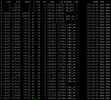jim.wilson
New Pleskian
- Server operating system version
- CentOS Linux 7.9.2009 (Core)
- Plesk version and microupdate number
- Plesk Obsidian
Hi all,
I am struggling to get a happy balance on pm.max_children and am having issues with the server maxing out resources
Following https://support.plesk.com/hc/en-us/articles/360011988053
Here is the results of ps -ylC php-fpm --sort:rss

Server: 64Gb, 32 Core
The server runs
a - very busy site (On Dedicated FPM > Apache)
b - average site (On Dedicated FPM > Apache)
c & d - very small sites (On Fast CGI)
Site a regularly has problems with FPM consuming vast CPU & memory
Any thoughts/suggestions on how to balance / resolve issues ?
Thanks
I am struggling to get a happy balance on pm.max_children and am having issues with the server maxing out resources
Following https://support.plesk.com/hc/en-us/articles/360011988053
Here is the results of ps -ylC php-fpm --sort:rss

Server: 64Gb, 32 Core
The server runs
a - very busy site (On Dedicated FPM > Apache)
b - average site (On Dedicated FPM > Apache)
c & d - very small sites (On Fast CGI)
Site a regularly has problems with FPM consuming vast CPU & memory
Any thoughts/suggestions on how to balance / resolve issues ?
Thanks

